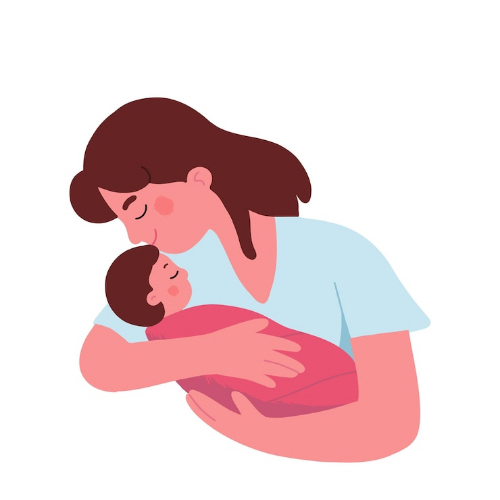Save 25% On Your First Autoship Order
Save 25% On Your First Autoship Order

Childbirth is an important event in a woman’s life. Having a baby is an exciting and memorable experience but it can also be physically grueling and mentally difficult. Postpartum period is a phase of extreme physical and emotional transition with intense biological, psychological, and hormonal changes.
It is not uncommon for new moms to experience the “baby blues,” a postpartum mood disorder that commonly includes feelings of sadness, stress, and anxiety. The baby blues typically start within 2-3 days after delivery and may last for up to two weeks, and the symptoms will resolve on their own. But if the symptoms do not cease and become more persistent and severe, it may be a sign of postpartum depression (PPD.)
According to CDC research, 1 in 8 women experience symptoms of postpartum depression which accounts for about 15%. PPD is a serious mental illness and does not resolve itself. Fortunately, treatment for postpartum depression works and will help you manage your symptoms and bond well with your baby.
Postpartum depression, also known as postnatal depression, is a form of depression that begins after childbirth. New moms go through tremendous changes physically and mentally, and some women cannot cope and develop symptoms of depression. PPD involves feelings of extreme sadness, anxiety, irritability, restlessness, and crying spells as well as changes in energy, sleep, and appetite.
Fathers also experience symptoms of postpartum depression. About 4% of men can have depression in the first year of their child’s birth.
Some women experience more serious kinds of depression, such as postpartum rage and postpartum psychosis, which are rare. Postpartum rage includes symptoms of PPD along with intense anger and irritability. Postpartum psychosis is a dreaded mental illness that may involve psychotic symptoms like delusions and hallucinations. This condition requires urgent medical intervention because it poses a threat to the life of the mother and her baby.
PPD symptoms may include:
If the above symptoms last longer than two weeks after childbirth and hamper your daily life, you should seek medical attention for prompt treatment.
Postpartum depression can occur anywhere from a couple of weeks to 12 months after childbirth. Therefore, no timeline can definitively say how long postpartum depression lasts for those who experience it. Without treatment, PPD can last for months or even years. If you experience postpartum mood disorders, you should seek medical attention for a prompt diagnosis.
When dealing with postpartum depression, early intervention is crucial for the mother’s mental health and the baby’s cognitive development. The sooner PPD is diagnosed, the better because an effective treatment plan can help you manage symptoms and improve your quality of life. Upon diagnosis and a prescribed treatment plan, symptoms can improve quickly.
The timeframe for recovery from PPD is different for everyone. If you have certain risk factors, your symptoms might last longer, even with treatment. The intensity of your depressive symptoms and how long you experienced symptoms before beginning treatment may also affect how long your PPD lasts. However, with the right treatment, especially when it is started early, you can find relief even if you have certain risk factors.



It is important to understand that if you have postpartum depression, it is not your fault. It is a common mood disorder affecting many women, but it does not mean they are bad mothers. Some women can overcome the symptoms early, while for some, it takes time. Several factors may contribute to postpartum depression that lasts longer.
The exact cause of postpartum depression is currently unknown. A combination of factors may contribute to its development. These factors may include:
Some women may have concerns about their physical appearance and feel less attractive, struggle with their sense of identity, and feel they have lost control over their life. These social, physical, and psychological issues can play a role in PPD.
If you are diagnosed with postpartum depression, it is essential to start treatment as early as possible to be back to your normal self. There are several treatment options available for people experiencing postpartum depression. PPD treatment depends on the type of symptoms you have and how severe they are. Your physician will be able to offer an effective treatment plan that works for your condition.
Parenting is not easy, and it is normal to feel overwhelmed at times. Many new moms experience highs and lows in the first weeks and months after childbirth. Following are some tips that can help you manage depression:
Postpartum depression lasts longer than the typical “baby blues” and can begin anytime within the first year after the baby is born. If you notice symptoms of PPD, talk to your doctor. PPD is a common condition and is easily treatable. If you have concerns about the way you feel, there is no shame in seeking medical support. It is the first step towards recovery and the health and well-being of you and your baby.
Disclaimer: All content found on our website, including images, videos, infographics, and text were created solely for informational purposes. Our reviewed content should never be used for the purpose of diagnosis or treatment of any medical conditions. Content shared on our websites is not meant to be used as a substitute for advice from a certified medical professional. Reliance on the information provided on our website as a basis for patient treatment is solely at your own risk. We urge all our customers to always consult a physician or a certified medical professional before trying or using a new medical product.

Sailaxmi Chennuru, has been a Health Products For You contributor since 2017. A business management graduate, the study of anatomy has always been of interest to her.
After working as a medical transcriptionist for several years, she developed a keen interest ...
How To Increase Iron Levels Quickly
It’s a question that must have puzzled you like many others. Iron is essential in hemoglobin production and its inadequate levels can negatively impact your health. Dive into this informative article to explore top iron-rich foods that can help you fight iron deficiency.
10 Best Coccyx Cushions for Tailbone Pain
If you're like most people, you spend about 8 to 10 hours sitting every day. However unhealthy, it is part of life for many, and can cause tailbone pain. Coccyx cushions can help alleviate this pain. Click to read more and find the perfect coccyx cushion for your tailbone pain.
5+ Best Adult Diapers for Fecal Incontinence
Dealing with fecal incontinence can be challenging, but you're not alone. Read this article and navigate through discreet and effective solutions that help you manage fecal incontinence and let you live life on your terms with confidence and comfort.
Top 5 Best Reviewed Nebulizers of 2024
Need an effective and affordable nebulizer? Look no further, in this article we offer 5 of our best reviewed nebulizers that are loved by our customers. Click to read more and find the perfect nebulizer for all your respiratory needs.
10 Best Penis Pumps For Erectile Dysfunction
For anyone dealing with erectile dysfunction, penis pumps serve as a great way to manage it. But with so many products available, determining the best one for your needs can be challenging. To assist you in refining your choices and making an informed decision, here are our top 10 options, recognized for their effectiveness and safety.